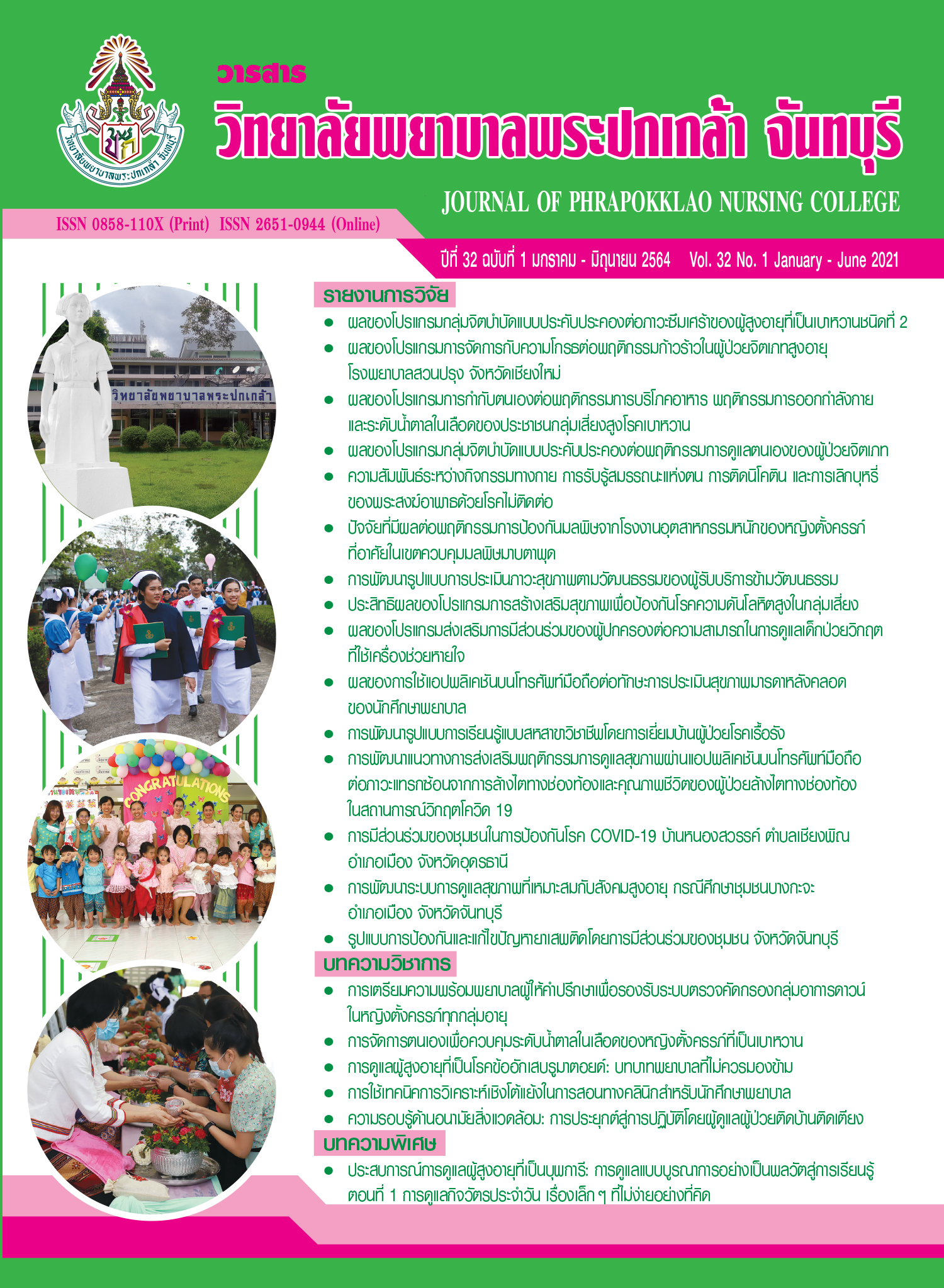The Effects of Using Mobile Phone Application on Health Assessment Skill for Postpartum Mother among Nursing Students
Keywords:
Mobile phone application, Health assessment of postpartum mother, Nursing studentsAbstract
This quasi-experimental research aimed to examine the effects of using mobile phone application on health assessment skill for postpartum mother among nursing students. The samples consisted of 48, 3rd-year nursing students who studied at Phrapokklao Nursing College, Chanthaburi, in an academic year of 2019 and were equally divided into the experimental group (n = 24) and the control group (n = 24). The research instruments included the mobile phone application, the questionnaire of general data, and the assessment form of health assessment skill for postpartum mother with reliability as .91. The implementation and data collection were conducted from October to December, 2019. Data were analyzed using frequency, percentage, mean, standard deviation, independent t-test, and two-way repeated measures ANOVA with multiple comparisons by Bonferroni method.
The research results revealed that 1) at the post-test period and the 2-week follow-up period, the experimental group had statistically significant higher mean scores of health assessment skill for postpartum mother than those of the control group (p < .001); and 2) at the post-test period and the 2-week follow-up period, the experimental group had statistically significant higher mean scores of health assessment skill for postpartum mother than that of the pre-test period (p < .001).
This research suggests that nursing instructors should apply this mobile phone application as a media for learning and teaching health assessment for postpartum mother as well as for nursing practicum preparation or real situation of nursing practicum.
References
ชัชนาฎ ณ นคร, และธัญลักษณ์ บรรลิขิตกุล. (2556). ความสามารถของนักศึกษาพยาบาลชั้นปีที่ 2 วิทยาลัยพยาบาลสภากาชาดไทย ในการดูแลผู้รับบริการที่มีบาดแผล ในรายวิชาปฏิบัติการพยาบาลพื้นฐาน. วารสารพยาบาลสภากาชาดไทย, 6(1), 34–47.
ติมาพร ศรีเวียง, วิวัฒน์ มีสุวรรณ์, และพิชญาภา ยวงสร้อย. (2560). การพัฒนาแอพพลิเคชันบนคอมพิวเตอร์แท็บเล็ต เรื่อง อาเซียนศึกษา สำหรับนักเรียนชั้นประถมศึกษาปีที่ 1. วารสารศึกษาศาสตร์ มหาวิทยาลัยนเรศวร, 19(1), 231–238.
ธิดารัตน์ เลิศวิทยากุล, และลัดดา พลพุทธา. (2561). การใช้กระบวนการพยาบาลในการฝึกปฏิบัติงานบนคลินิก ของนักศึกษาพยาบาล. วารสารวิทยาลัยบัณฑิตเอเชีย, 8(2), 76–88.
ปาจรีย์ ตรีนนท์, สำเร็จ เทียนทอง, ธีราภรณ์ บุญล้อม, ชิณท์ณภัทร วันชัย, ชลธิชา บุญบรรจง, ญาสุมินทร์ พลเทพ, … ดนัย ผลสะอาด. (2562). ผลของการใช้สื่อการเรียนรู้แอพพลิเคชั่นเพื่อพัฒนาความรู้ และทักษะการช่วยฟื้นคืนชีพขั้นพื้นฐานสำหรับนักเรียนมัธยมศึกษาตอนปลาย. วารสารการพยาบาลและการดูแลสุขภาพ, 37(3), 98–105.
มณีภรณ์ โสมานุสรณ์. (บ.ก.). (2559). การพยาบาลสูติศาสตร์ เล่ม 2 (พิมพ์ครั้งที่ 13). นนทบุรี: ยุทธรินทร์การพิมพ์.
ยศพล เหลืองโสมนภา, พีระเดช สำรวมรัมย์, ผกามาศ พิมพ์ธารา, ธันวา มิคอ, ดวงประเสริฐ ประสงค์, ธิดาพร กลางใจ, และณัฐสุดา สุขกลีบ. (2563). ผลของการใช้แอปพลิเคชันบนโทรศัพท์มือถือต่อการเพิ่มทักษะการบริหารยาโดปามีนตามการรับรู้ของนักศึกษาพยาบาล. วารสารศูนย์การศึกษาแพทยศาสตร์คลินิก โรงพยาบาลพระปกเกล้า, 37(2), 134–143.
รมณียา สุรธรรมจรรยา. (2558). ผลการใช้แอพพลิเคชั่นสำหรับสอนคำศัพท์ภาษาอังกฤษบนแท็บเล็ตวิชาภาษาอังกฤษสำหรับนักเรียนชั้นประถมศึกษาปีที่ 2 สังกัดสำนักงานเขตพื้นที่การศึกษาประถมศึกษาราชบุรี เขต 2 (วิทยานิพนธ์ปริญญามหาบัณฑิต). นครปฐม: มหาวิทยาลัยศิลปากร.
รวีพร จรูญพันธ์เกษม, ดารณี ธัญญสิริ, พรพิมล เสมเจริญ, และณัฎฐกิตติ์ เจริญสุข. (2561). การพัฒนารูปแบบการสอนโดยอาศัยแอปพลิเคชันการอ่านออกเสียงด้วยระบบรู้จำเสียงพูด และเกมทายคำศัพท์ภาษาอังกฤษ. วารสารวิทยาศาสตร์และเทคโนโลยี หัวเฉียวเฉลิมพระเกียรติ, 4(1), 56–68.
Chang, H.-Y., Wu, H.-F., Chang, Y.-C., Tseng, Y.-S., & Wang, Y.-C. (2021). The effects of a virtual simulation-based, mobile technology application on nursing students’ learning achievement and cognitive load: Randomised controlled trial. Retrieved from file:///C:/Users/Asus/Downloads/1-s2.0-S0020748921000912.pdf
Gray, J. R., Grove, S. K., & Sutherland, S. (2017). Burns and Grove’s the practice of nursing research: Appraisal, synthesis, and generation of evidence (8th ed.). St. Louis: Elsevier.
Kim, H., & Suh, E. E. (2018). The effects of an interactive nursing skills mobile application on nursing students’ knowledge, self-efficacy, and skills performance: A randomized controlled trial. Asian Nursing Research, 12(1), 17–25. doi:10.1016/j.anr.2018.01.001
Kim, S.-J., Shin, H., Lee, J., Kang, S., & Bartlett, R. (2017). A smartphone application to educate undergraduate nursing students about providing care for infant airway obstruction. Nurse Education Today, 48, 145–152. doi:10.1016/j.nedt.2016.10.006
Koohestani, H. R., Arabshahi, S. K. S., Fata, L., & Ahmadi, F. (2018). The educational effects of mobile learning on students of medical sciences: A systematic review in experimental studies. Journal of Advances in Medical Education & Professionalism, 6(2), 58–69.
Masters, K. (2013). Edgar dale’s pyramid of learning in medical education: A literature review. Medical Teacher, 35(11), e1584–e1593. doi:10.3109/0142159X.2013.800636
Valk, J.-H., Rashid, A. T., & Elder, L. (2010). Using mobile phones to improve educational outcomes: An analysis of evidence from Asia. International Review of Research in Open and Distance Learning, 11(1), 117–140. Retrieved from https://files.eric.ed.gov/fulltext/EJ881581.pdf
Downloads
Published
How to Cite
Issue
Section
License
เนื้อความ ข้อมูล และรายการอ้างอิงที่ผู้เขียนใช้ในการเขียนบทความเพื่อลงตีพิมพ์ในวารสารวิทยาลัยพยาบาลพระปกเกล้า จันทบุรี ถือเป็นความคิดเห็นและความรับผิดชอบของผู้เขียน คณะผู้จัดทำวารสารไม่จำเป็นต้องเห็นพ้องด้วยหรือร่วมรับผิดชอบ
บทความที่ได้รับการลงตีพิมพ์ในวารสารวิทยาลัยพยาบาลพระปกเกล้า จันทบุรี ถือเป็นลิขสิทธิ์ของวารสารวิทยาลัยพยาบาลพระปกเกล้า จันทบุรี หากหน่วยงานหรือบุคคลใดต้องการนำส่วนหนึ่งหรือทั้งหมดของบทความไปเผยแพร่ต่อเพื่อวัตถุประสงค์ใด ๆ จะต้องได้รับอนุญาตจากบรรณาธิการวารสารก่อน



